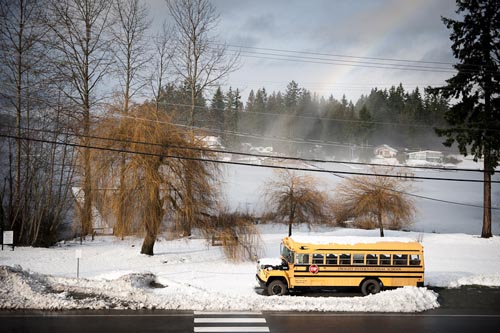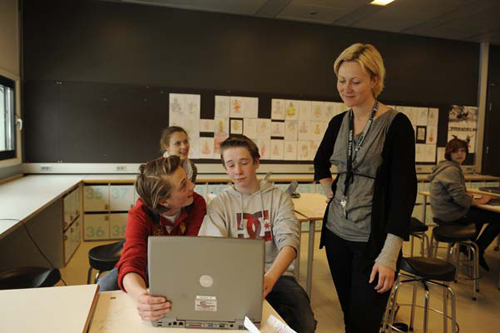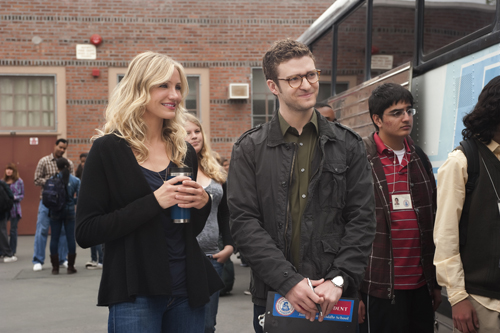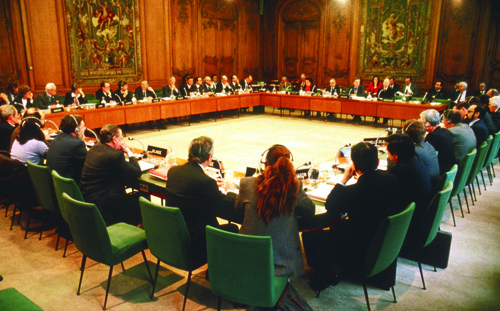
Professor Charles Ungerleider tells me he wrote his book, Failing Our Kids — How we are Ruining Our Public Schools (McClelland & Stewart, 2004), after he completed a term as Deputy Minister of Education for British Columbia. Pour 40 years he had observed the Canadian education system from a variety of vantage points: as teacher, professeur, trustee, parent, and deputy minister. Au cours de cette période, he watched the largely successful Canadian educational system become so overburdened with increasing demands, he believed the system would ultimately collapse unless expectations were properly reconsidered.
Charles Ungerleider is Professor of Sociology of Education at the University of British Columbia. He is also Director of Research and Managing Director of Directions, Evidence and Policy Research Group. Cette semaine La recherche globale pour l'éducation, he discusses our big picture questions and shares his views on how to nurture and support a successful education system. (Note de la rédaction: Canada currently ranks in the top 10 countries in all the PISA test subjects, well ahead of the U. S.)
Quel type de système éducatif permettra à un pays d'avoir les compétences humaines nécessaires pour être compétitif à l'échelle mondiale?
There is an inherent tension in education between its traditional mission of social development and nation building, and the post war development of human capital and international economic competition. The extreme post war emphasis on economic development is a burden on public schools because the ability to compete economically with other nations is not entirely, or even mostly, dependent upon the education system.
I bristle a little bit when people talk about global competitiveness, because I worry we’re focused on global economic competitiveness and sacrificing social and cultural development. Every society wrestles with the question of what kind of an educational system it will create to realize its vision of itself as a nation. I worry about an education system that cultivates its human capital to produce economically and ignores the social and cultural development of its people.
What are your views on standardized testing?
I am not an opponent of standardized testing, but I am an opponent of high stakes standardized testing. I am opposed to punishing schools and teachers on the basis of standardized testing results and depriving them of the resources they need to improve learning. Anyone who thinks about assessment will recognize that a child’s performance on any given assessment is the cumulative expression of all their prior learning, not just what happened that year or in that school. En outre, 70% of the variation in student achievement is accounted for by factors outside of the control of schools. Juste à propos de 30% of the variance in student achievement is attributable to school related factors, and only about half of those are ones that we can explain.
Recognizing the 70/30 ratio has two important implications for those who wish to improve student achievement. Première, assessment is the starting point, not the end point. What you have to be able to do is identify school factors amenable to policy influence that are capable of affecting change in student achievement. Deuxième, you will maximize the benefits of the school’s efforts if they are complemented by policies to support families and communities, such as living wages, equal pay for work of equal value, generous maternity and parenting leaves, affordable day and after school care, and the like.

“I worry about an education system that cultivates its human capital to produce economically and ignores the social and cultural development of its people.” — Charles Ungerleider
What is the biggest school factor that affects change in student achievement?
The most important thing is the teachers in the classroom. You are not going to do anything of any serious consequence to improve student achievement or accomplish any serious educational purpose without ensuring that you have well-educated, well-prepared professionals in the classroom. It is not the material or the way schools are organized, but the teacher who makes most of the difference in the school’s contribution to student achievement. Excellent teaching means recruiting people who have the requisite knowledge and dispositions to the tasks, et de les payer bien.
Quelles sont les principales étapes qui doivent être prises pour améliorer le calibre des enseignants dans le système d'éducation publique?
La préparation professionnelle initiale que les enseignants reçoivent, and the continuing professional education that occurs over the course of their careers, influence their performance. Despite improvement over time, the preparation that teachers receive is more guided by ideology than evidence, and is not commensurate with the challenges that teachers face. Teacher certification authorities could help by strengthening the standards by which applicants for initial certification are evaluated and by applying standards that ensure currency of professional knowledge and practice.
What can be done to better address the emotional well-being of kids today given the rise in competition and the pressure to achieve?
This is the first generation in the history of mental health statistics where the mental health of the kids is not superior to that of their seniors. It is much harder to grow up today. We had a more nurturing and respectful notion of child rearing in the past.
As a society, we are not as concerned about the young as we once were. The attention of the community has moved away from being nurturing and raising the young to how am Je Faire. Am Je going to be all right? Et, how does my child’s achievement reflect on moi?
We need to equip kids with the dispositions and the knowledge that they need in order to thrive in a changing world. We also need to think about the dispositions that people need to live in community with others, to contribute socially and culturally to their communities. For this, a caring and nurturing environment is important.
Aside from addressing the family and economic issues of students in poverty, what are the main steps you would take to improve the academic capabilities of these students?
Students living in impoverished circumstances often exhibit inadequate school readiness. There are a number of policies that will help to address the problems:
o Équipé classes de maternelle avec des jouets et des matériaux appropriés aux numéros d'apprentissage, couleurs, et des formes. o Provide opportunities for students to develop fine motor skills. o Encourage oral expression. Ensure that teachers answer students’ des questions, écouter leur discours, répondre à leurs demandes, and help them demonstrate some achievement. Provide an environment in which children are emotionally supported and teachers use complex vocabulary and sentences in their communication with them. o Ensure that teachers take children out of school to explore the community and to visit neighborhood institutions. o Ensure that teachers display the products of student school work in visible places within the school and in the community. o Administer diagnostic assessments of (1) phonemic awareness, (2) vocabulary, (3) letter naming, et (4) single word reading; provide interventions to address identified deficits, and ensure that teachers concentrate on deficiencies in these areas, le suivi des progrès de l'élève jusqu'à ce que les élèves atteignent ou dépassent constamment les attentes de qualité de niveau.
Sagesse du monde
1. We should be concerned about an educational system that cultivates its human capital to produce economically and ignores the social and cultural development of its people.
2. 70% of the variation in student achievement is attributable to factors outside of the control of schools. Successful education depends upon complementary social policies.
3. The most important factor that affects student achievement is the teachers in the classroom. 4. Professional preparation and ongoing education of teachers are essential factors in teacher performance.

Photos provided courtesy of the Dwight International School in Canada and Charles Ungerleider.
Dans La recherche globale pour l'éducation, rejoindre C. M. Rubin et leaders d'opinion de renommée mondiale dont Sir Michael Barber (Royaume-Uni), Dr. Leon Botstein (États-Unis), Dr. Linda Darling-Hammond (États-Unis), Dr. Madhav Chavan (Inde), Le professeur Michael Fullan (Canada), Professeur Howard Gardner (États-Unis), Professeur Yvonne Hellman (Pays-Bas), Professeur Kristin Helstad (Norvège), Professeur Rose Hipkins (Nouvelle-Zélande), Professeur Cornelia Hoogland (Canada), Mme. Chantal Kaufmann (Belgique), Professor Dominique Lafontaine (Belgique), Professeur Hugh Lauder (Royaume-Uni), Professeur Ben Levin (Canada), Professeur Barry McGaw (Australie), Professeur R. Natarajan (Inde), Sridhar Rajagopalan (Inde), Sir Ken Robinson (Royaume-Uni), Professeur Pasi Sahlberg (Finlande), Andreas Schleicher (PISA, OCDE), Dr. David Shaffer (États-Unis), Dr. Kirsten immersive, (Norvège), Chancelier Stephen Spahn (États-Unis), Yves Thézé (Lycee Francais US), Professeur Charles Ungerleider (Canada), Professeur Tony Wagner (États-Unis), Professeur Dylan Wiliam (Royaume-Uni), Professeur Theo Wubbels (Pays-Bas), Professeur Michael Young (Royaume-Uni), et le professeur Zhang Minxuan (Chine) alors qu'ils explorent les grandes questions d'éducation de l'image que toutes les nations doivent faire face aujourd'hui. La recherche globale pour l'éducation communautaire page
C. M. Rubin est l'auteur de deux séries en ligne largement lecture pour lequel elle a reçu une 2011 Upton Sinclair prix, "Le Global Search pour l'éducation» et «Comment allons-nous savoir?"Elle est également l'auteur de trois livres à succès, Y compris The Real Alice au pays des merveilles.
Suivez C. M. Rubin sur Twitter: www.twitter.com/@cmrubinworld






Commentaires récents